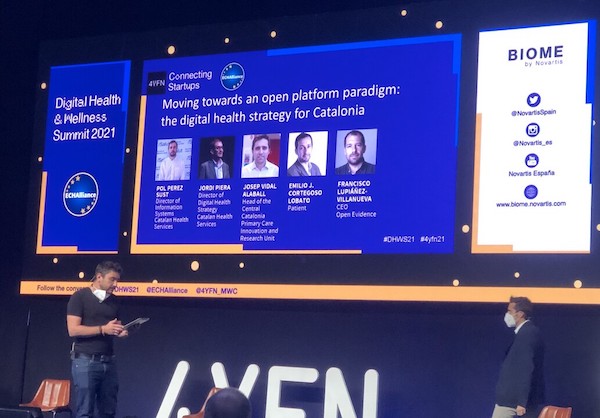 The problem is that hospitals are big and getting bigger, going from building to buildings to campuses. They are expensive and getting more expensive. At some point, we have to ask: is this really how we want to spend our healthcare dollar? Some hospitals are figuring other ways to spend their -- I mean, "our" -- money on our health. Take Nationwide Children's Hospital. Located in a somewhat blighted neighborhood of Columbus (OH), its Healthy Neighborhoods Healthy Families (HNHF) program "treats the neighborhood as the patient," as their summary in Pediatrics put it. The hospital is leading a partnership that has built 58 affordable housing units, renovated 71 homes, given out 158 home improvement projects, and helped spur a 58 unit housing/office development. They've also hired 800 local residents and instituted a jobs training program.
The problem is that hospitals are big and getting bigger, going from building to buildings to campuses. They are expensive and getting more expensive. At some point, we have to ask: is this really how we want to spend our healthcare dollar? Some hospitals are figuring other ways to spend their -- I mean, "our" -- money on our health. Take Nationwide Children's Hospital. Located in a somewhat blighted neighborhood of Columbus (OH), its Healthy Neighborhoods Healthy Families (HNHF) program "treats the neighborhood as the patient," as their summary in Pediatrics put it. The hospital is leading a partnership that has built 58 affordable housing units, renovated 71 homes, given out 158 home improvement projects, and helped spur a 58 unit housing/office development. They've also hired 800 local residents and instituted a jobs training program.
health systems
See the following -
1.13M Patient Records Breached from January to March 2018
 Proprietary, non-public data from Protenus shows disclosed breaches are just one one-thousandth of the actual risk health systems routinely carry...1,129,744 patient records were breached between January and March 2018, according to new data released today in the Protenus Breach Barometer. Published by Protenus, an artificial intelligence platform used by top health systems to analyze every access to patient data inside the electronic health record (EHR), the Breach Barometer is the industry’s definitive source for health data breach reporting. In the first quarter of 2018, the average of at least one data breach per day in healthcare continued to hold true with 110 health data breaches.
Proprietary, non-public data from Protenus shows disclosed breaches are just one one-thousandth of the actual risk health systems routinely carry...1,129,744 patient records were breached between January and March 2018, according to new data released today in the Protenus Breach Barometer. Published by Protenus, an artificial intelligence platform used by top health systems to analyze every access to patient data inside the electronic health record (EHR), the Breach Barometer is the industry’s definitive source for health data breach reporting. In the first quarter of 2018, the average of at least one data breach per day in healthcare continued to hold true with 110 health data breaches.
- Login to post comments
3 Ways Remote Care Helps Patients, Docs
Given the steady stream of new devices entering the healthcare market, it might be easy to start thinking improvements in healthcare can come from technological advances alone. But it's more complicated than that. Read More »
- Login to post comments
API Infrastructure Importance When Providing a Health Service
 In my ongoing review of application programming interfaces (APIs) as a technical solution for offering rich and flexible services in health care, I recently ran into two companies who showed as much enthusiasm for their internal technologies behind the APIs as for the APIs themselves. APIs are no longer a novelty in health services, as they were just five years ago. As the field gets crowded, maintenance and performance take on more critical roles in offering a successful business–so let’s see how Orion Health and Mana Health back up their very different offerings...
In my ongoing review of application programming interfaces (APIs) as a technical solution for offering rich and flexible services in health care, I recently ran into two companies who showed as much enthusiasm for their internal technologies behind the APIs as for the APIs themselves. APIs are no longer a novelty in health services, as they were just five years ago. As the field gets crowded, maintenance and performance take on more critical roles in offering a successful business–so let’s see how Orion Health and Mana Health back up their very different offerings...
- Login to post comments
Catalonia releases RFI on technology elements to build an open platform using openEHR ~ ECHAlliance
 The region of Catalonia has launched today a Request for Information (RFI) with the purpose to obtain technical information on the possibilities of supplying the elements of a technological platform for the development of the Electronic Health Record of Catalonia. Given the technical complexity of the technological platform for the development of the Electronic Health Record and the need to finish defining its design and the components of the platform to be tendered, as well as to inform the economic operators active in the market of the need that has arisen...
The region of Catalonia has launched today a Request for Information (RFI) with the purpose to obtain technical information on the possibilities of supplying the elements of a technological platform for the development of the Electronic Health Record of Catalonia. Given the technical complexity of the technological platform for the development of the Electronic Health Record and the need to finish defining its design and the components of the platform to be tendered, as well as to inform the economic operators active in the market of the need that has arisen...
- Login to post comments
CAV Systems to participate in HIMSS MarketConnect
 Uri Schor, Chief Technology Officer of CAV Systems Ltd, a leading enterprise software company from Israel, will be attending the HIMSS 2019 Global Conference & Exhibition, February 11 – 15, 2019 in Orlando, Florida. CAV Systems will be participating in MarketConnect, a matchmaking platform created as a collaboration between HIMSS and the Health 2.0 Innovation Team. MarketConnect is designed to break down the barriers of tech adoption within large health systems by directly connecting today’s leading tech companies with pre-qualified executives interested in commercial partnerships.
Uri Schor, Chief Technology Officer of CAV Systems Ltd, a leading enterprise software company from Israel, will be attending the HIMSS 2019 Global Conference & Exhibition, February 11 – 15, 2019 in Orlando, Florida. CAV Systems will be participating in MarketConnect, a matchmaking platform created as a collaboration between HIMSS and the Health 2.0 Innovation Team. MarketConnect is designed to break down the barriers of tech adoption within large health systems by directly connecting today’s leading tech companies with pre-qualified executives interested in commercial partnerships.
- Login to post comments
Cyberattacks Predicted to Triple in 2021, Black Book State of the Healthcare Industry Cybersecurity Industry Report
 Seventy-three percent of health system, hospital and physician organizations report their infrastructures are unprepared to respond. The survey results estimated 1500 healthcare providers are vulnerable to data breaches of 500 or more records, representing a three hundred percent increase over this year. Black Book Market Research LLC surveyed 2,464 security professionals from 705 provider organizations to identify gaps, vulnerabilities and deficiencies that persist in keeping hospitals and physicians proverbial sitting ducks for data breaches and cyber-attacks.
Seventy-three percent of health system, hospital and physician organizations report their infrastructures are unprepared to respond. The survey results estimated 1500 healthcare providers are vulnerable to data breaches of 500 or more records, representing a three hundred percent increase over this year. Black Book Market Research LLC surveyed 2,464 security professionals from 705 provider organizations to identify gaps, vulnerabilities and deficiencies that persist in keeping hospitals and physicians proverbial sitting ducks for data breaches and cyber-attacks.
- Login to post comments
Destructive Doctor Relationships Will Destroy Hospitals' Success
 The highest-performing healthcare organizations fundamentally understand the importance of the forgotten aim in the Quadruple Aim (caring for the caregivers). It’s common sense. My observation turned my inbox into a virtual confessional once I started focusing on the quadruple aim. The bad behavior of far too many hospital CEOs has created collateral damage for the economy and doctors. The only surprise is how most hospital CEOs aren’t recognizing how their actions are self-destructive.
The highest-performing healthcare organizations fundamentally understand the importance of the forgotten aim in the Quadruple Aim (caring for the caregivers). It’s common sense. My observation turned my inbox into a virtual confessional once I started focusing on the quadruple aim. The bad behavior of far too many hospital CEOs has created collateral damage for the economy and doctors. The only surprise is how most hospital CEOs aren’t recognizing how their actions are self-destructive.
- Login to post comments
First, We Tear Down All the Hospitals
- Login to post comments
Guess What: Docs Don't Like EHRs
 It's kind of "dog-bites-man" type news, but there is even more evidence that physicians not only don't think EHRs are helping them but actually see them as contributing to burnout. Researchers at the Mayo Clinic found that use of EHRs (or computerized physician order entries -- CPOEs) was associated with lower satisfaction with time spent on clerical tasks, with nearly half of physicians saying the amount of time spent on clerical tasks was unreasonable. No wonder the AMA CEO recently complained that physicians were turning into the "most expensive data entry force on the face of the planet."
It's kind of "dog-bites-man" type news, but there is even more evidence that physicians not only don't think EHRs are helping them but actually see them as contributing to burnout. Researchers at the Mayo Clinic found that use of EHRs (or computerized physician order entries -- CPOEs) was associated with lower satisfaction with time spent on clerical tasks, with nearly half of physicians saying the amount of time spent on clerical tasks was unreasonable. No wonder the AMA CEO recently complained that physicians were turning into the "most expensive data entry force on the face of the planet."
HELINA 2018: Call for Papers
 The 2018 edition of the Pan-African health informatics conference (HELINA) is scheduled from 3rd – 8th December 2018 in Nairobi, Kenya. The conference will be hosted by the Kenya Health Informatics Association (KeHIA) and will focus on how technology is being used to strengthen health systems in the African Region. HELINA conferences have been known to provide a platform for both academia and industry to showcase results of scientific research and industry practice.
The 2018 edition of the Pan-African health informatics conference (HELINA) is scheduled from 3rd – 8th December 2018 in Nairobi, Kenya. The conference will be hosted by the Kenya Health Informatics Association (KeHIA) and will focus on how technology is being used to strengthen health systems in the African Region. HELINA conferences have been known to provide a platform for both academia and industry to showcase results of scientific research and industry practice.
- Login to post comments
Hospital CEOs Behaving Badly And The Devastating Consequences On The Middle Class
 When big health insurers propose mergers, it makes for good antitrust enforcement theater to try to block them. However, if government officials want to address anti-competitive activities that have a dramatically bigger impact, they should shift their focus to local market provider M&A activity that consistently show prices increase after the deal is done. However, the most rapacious, anti-competitive practices I’ve seen in my entire career have come from hospitals–frequently from tax-exempt “nonprofits” that would make John D. Rockefeller blush with their brutal actions. The combined impact has created a middle class economic depression that has driven populist presidential campaign success, which was highlighted in a recently released Brookings study.
When big health insurers propose mergers, it makes for good antitrust enforcement theater to try to block them. However, if government officials want to address anti-competitive activities that have a dramatically bigger impact, they should shift their focus to local market provider M&A activity that consistently show prices increase after the deal is done. However, the most rapacious, anti-competitive practices I’ve seen in my entire career have come from hospitals–frequently from tax-exempt “nonprofits” that would make John D. Rockefeller blush with their brutal actions. The combined impact has created a middle class economic depression that has driven populist presidential campaign success, which was highlighted in a recently released Brookings study.
- Login to post comments
Is WeWork's Ecosystems Approach a Model for Healthcare Platforms?
 Maybe you don't work in a WeWork office setting. Maybe you haven't ever visited one. Maybe you haven't even heard of WeWork. In that case, then you'll probably be surprised that this audacious real estate start-up now has a valuation close to $50b, with over 400,000 "members" in 100 cities across 27 countries (and they claim to "touch" 5 million people worldwide). Or that their plans go well beyond their unique twist towards office sharing. Who in healthcare is thinking about them, and who should be worried...or intrigued?...WeWork was never just about finding people and companies office space: it wanted to "help people work to make a life, not just a living." It focused on building a culture in its spaces, complete with amenities and events to help build a community among its members.
Maybe you don't work in a WeWork office setting. Maybe you haven't ever visited one. Maybe you haven't even heard of WeWork. In that case, then you'll probably be surprised that this audacious real estate start-up now has a valuation close to $50b, with over 400,000 "members" in 100 cities across 27 countries (and they claim to "touch" 5 million people worldwide). Or that their plans go well beyond their unique twist towards office sharing. Who in healthcare is thinking about them, and who should be worried...or intrigued?...WeWork was never just about finding people and companies office space: it wanted to "help people work to make a life, not just a living." It focused on building a culture in its spaces, complete with amenities and events to help build a community among its members.
- Login to post comments
NC State Develops Silver Nanotechnology to Kill Superbugs and Infections
As the number of joint replacement surgeries in the U.S. grows, so are concerns about the complications of infection from antibiotic-resistant “superbugs.” Biomedical engineers at NC State University are fighting back by developing nanotechnology built directly into orthopedic implants using a battery-activated device to power an army of microscopic germ-killers. Even antibiotic-resistant bacteria such as MRSA are on the hit list. Read More »
- Login to post comments
New Study Shows Patients Prefer Immediate Access to Test Results and have Unmet Information Needs
 A recent study of 8,000 patients that accessed their test results via an online patient portal found that more than 95% wanted to continue to immediately receive test results through their portal. That percentage stayed at 95% when focused on patients with non-normal results. These findings come amid concerns that the immediate release of test results could lead to patient distress when patients access test results before their physicians could contact them and help to interpret those results...since the ONC information blocking regulations became applicable to health care providers on April 5, 2021, a patient may be able to access test results in parallel to those results’ availability to the ordering clinician.
A recent study of 8,000 patients that accessed their test results via an online patient portal found that more than 95% wanted to continue to immediately receive test results through their portal. That percentage stayed at 95% when focused on patients with non-normal results. These findings come amid concerns that the immediate release of test results could lead to patient distress when patients access test results before their physicians could contact them and help to interpret those results...since the ONC information blocking regulations became applicable to health care providers on April 5, 2021, a patient may be able to access test results in parallel to those results’ availability to the ordering clinician.
- Login to post comments
Open Eyes And Raspberry Pis
An open source electronic patient record system developed at Moorfields Eye Hospital NHS Foundation Trust will be deployed across 40 sites in developing Commonwealth countries. Part of the project involves developing the EPR to run on the low cost Raspberry Pi computers and mobile devices.
- Login to post comments